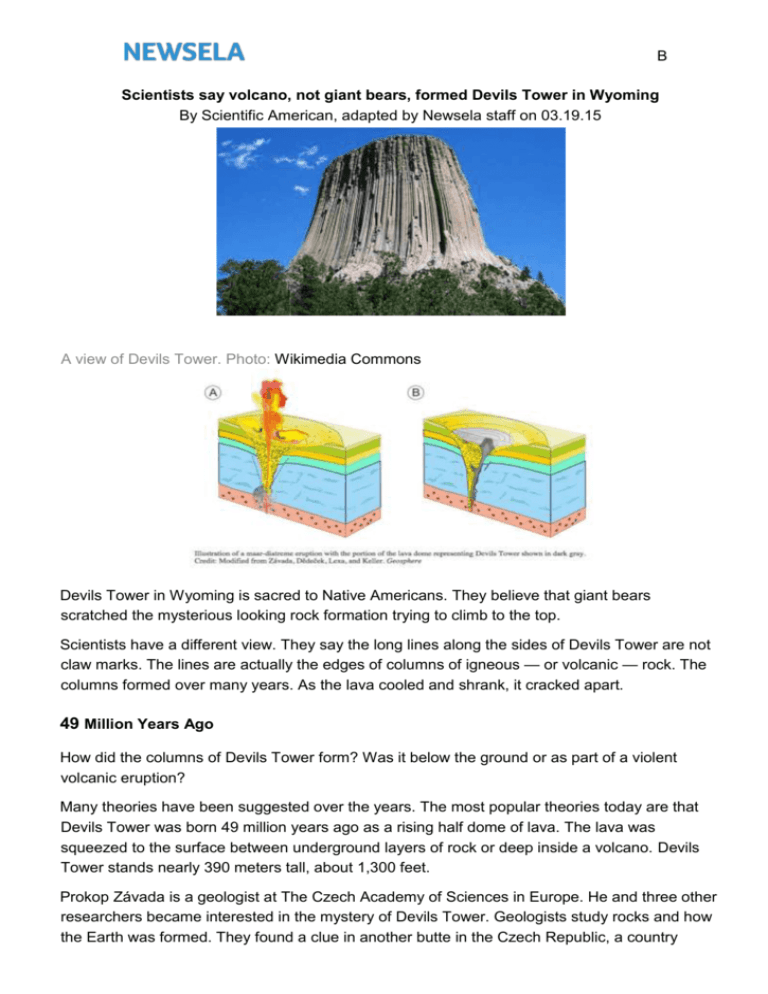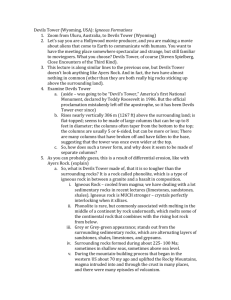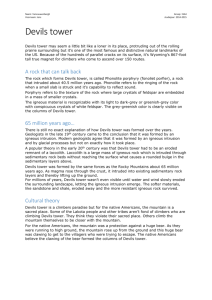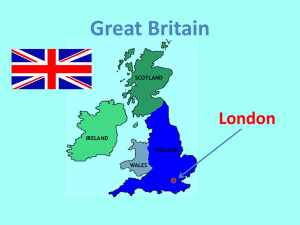9.28 Group B
advertisement

B Scientists say volcano, not giant bears, formed Devils Tower in Wyoming By Scientific American, adapted by Newsela staff on 03.19.15 A view of Devils Tower. Photo: Wikimedia Commons Devils Tower in Wyoming is sacred to Native Americans. They believe that giant bears scratched the mysterious looking rock formation trying to climb to the top. Scientists have a different view. They say the long lines along the sides of Devils Tower are not claw marks. The lines are actually the edges of columns of igneous — or volcanic — rock. The columns formed over many years. As the lava cooled and shrank, it cracked apart. 49 Million Years Ago How did the columns of Devils Tower form? Was it below the ground or as part of a violent volcanic eruption? Many theories have been suggested over the years. The most popular theories today are that Devils Tower was born 49 million years ago as a rising half dome of lava. The lava was squeezed to the surface between underground layers of rock or deep inside a volcano. Devils Tower stands nearly 390 meters tall, about 1,300 feet. Prokop Závada is a geologist at The Czech Academy of Sciences in Europe. He and three other researchers became interested in the mystery of Devils Tower. Geologists study rocks and how the Earth was formed. They found a clue in another butte in the Czech Republic, a country located in Eastern Europe. A butte is a hill with steep sides and a flat top. The butte in the Czech Republic is called Boren. It is similar to Devils Tower, although it is more rounded and covered with trees. Volcano Called A Maar-Diatreme The researchers concluded that Boren was created by a sudden type of volcano called a maardiatreme. In this kind of volcano, underground lava touches water. The lava blasts a crater on the Earth's surface. After the blast, the researchers think, a flat dome of lava filled the crater, acting like a plug. Wind and rain chipped away at the edges of that dome. Eventually only its core remained, the butte called Boren. Devils Tower is very similar to Boren. Because of this, the Czech team decided to see if it was formed in the same way. The researchers looked at the two main characteristics of Devils Tower. The first was the shape of its columns. The second was the position of magnetic minerals within the columns. Taking A Sample, Building Models The National Park Service is in charge of Devils Tower. It let the researchers collect one rock sample from the rock formation. The researchers discovered that near the rock's base, tiny needle-shaped minerals are just about vertical, or up and down. That is the direction the lava flowed before it hardened. Closer to the top, the minerals turn horizontal, or onto the side. Next, the researchers made models of volcanic explosions. They mixed some tiny magnetic particles into soft plaster. Then they squeezed the material upward through a cone full of earth and rock until it formed a mound on the surface. When the plaster hardened, the researchers cut the cone open. They examined the insides. They measured which way the magnetic particles faced just as they had done at Devils Tower. They also made computer models of cooling volcanic rock. They compared columns of lava as they cooled under different conditions. Does The Answer Bear Up? The vertical columns of Devils Tower matched the pattern exactly. Závada and his team concluded that Devils Tower was also caused by an underground volcano. Bernard Housen, of Western Washington University, was not involved in the study. He said their work was “interesting" and made sense. However, he was not convinced it was the only answer. He said there just is not enough information from Devils Tower itself since the government will not let them take many samples. “So, it is likely that the origin of Devils Tower will remain uncertain," he said. One reason for that is because the government wants to make sure Devils Tower is preserved, Housen said. It might be possible to study the similar, if less dramatic, buttes near Devils Tower. They were likely formed in the same way — with or without the help of giant bears. Quiz 1 2 What is the main idea of the section "49 Million Years Ago"? (A) Scientists think that Devils Tower is 49 million years old, but that a butte in Europe is older. (B) Scientists think Devils Tower is 49 million years old, but they are not sure. (C) Scientists think that Devils Tower was created 49 million years ago as a result of a volcano explosion. (D) Scientists believe that 49 million years ago there were no rock formations like Devils Tower. Which sentence from the article contains an idea that would be MOST important to include in a summary of the article? (A) Many theories have been suggested over the years. The most popular theories today are that Devils Tower was born 49 million years ago as a rising half dome of lava. (B) Prokop Závada is a geologist at The Czech Academy of Sciences in Europe. He and three other researchers became interested in the mystery of Devils Tower. (C) The researchers concluded that Boren was created by a sudden type of volcano called a maar-diatreme. In this kind of volcano, underground lava touches water. (D) The researchers looked at the two main characteristics of Devils Tower. The first was the shape of its columns. The second was the position of magnetic minerals within the columns. 3 4 Why does the article include the pictures labeled A and B? (A) to show how a type of volcano explosion might have caused Devils Tower to form (B) to show how a volcano explosion looks different from Devils Tower (C) to show that some volcanoes explode high into the air and others do not (D) to show what a volcano looks like when it erupts and what it looks like before it erupts The photograph of Devils Tower is MOST important to the reader because it shows (A) the shape of the tower's columns (B) the minerals that are within the columns (C) the height of the tower (D) the flat surface of the tower's top







